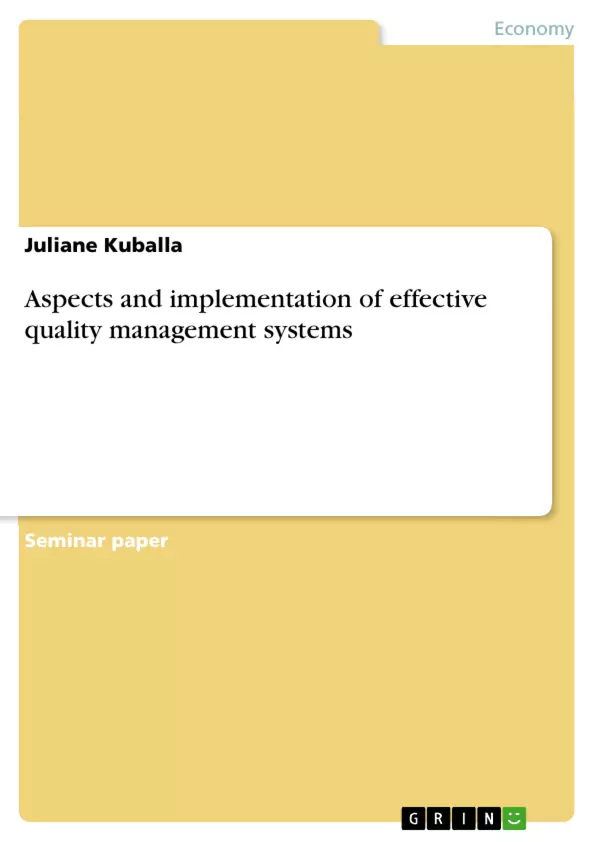Today due to the increasing global competition the relevance of quality has become as important as never before. Companies have realized that the satisfaction of customers’ needs must be placed in the centre of their efforts. In this context the development and manufacturing of high quality products and services at lower costs as well as the establishment of quality control systems are mainly responsible for gaining and sustaining competitive advantage. This article aims to demonstrate how quality systems must be implemented and developed to guarantee a satisfactory output. A short summary of historical events is provided to state the origin of quality systems. Further keynotes of pioneering quality gurus are presented to provide an understanding for the basic ideas behind quality management. Moreover key factors of TQM are defined and discussed to demonstrate in which way quality systems must be implemented to affect the creation of real quality outputs. In this context it is primarily highlighted why the principles of TQM are widely incompatible with traditional top-down management approaches. Moreover the need for local adaptation of TQM practices of global companies due to cultural differences is pointed out. In this context the different approaches to quality management in Eastern and Western countries are stated.
Inhaltsverzeichnis (Table of Contents)
- Abstract
- Historical framework
- Leading quality-gurus and their philosophies
- Total Quality Management (TQM)
- Critical success factors of TQM implementation
- Customer orientation
- Leadership commitment
- Participation and teamwork
- Process focus and continuous improvement
- Management by fact
- Quality management in a global context - managing cultural differences
- Conclusion
Zielsetzung und Themenschwerpunkte (Objectives and Key Themes)
This article examines the implementation and development of effective quality management systems in a global context. It emphasizes the significance of quality in today's competitive business environment and explores how quality systems can contribute to gaining and maintaining a competitive edge.
- The historical evolution of quality management systems
- Key principles and philosophies of quality gurus
- Critical success factors for implementing Total Quality Management (TQM)
- The impact of cultural differences on quality management practices
- The role of quality systems in achieving customer satisfaction
Zusammenfassung der Kapitel (Chapter Summaries)
- The article begins with a historical overview of quality management, highlighting the shift from traditional inspection-based approaches to more comprehensive quality systems. It emphasizes the influence of the Japanese quality revolution in the late 1970s and the subsequent adoption of quality management principles in Western countries.
- The chapter then introduces key quality gurus and their philosophies, including Deming, Juran, Crosby, Feigenbaum, and Ishikawa. It explores their shared vision of customer-driven quality and the importance of management commitment, continuous improvement, and a change in organizational culture.
Schlüsselwörter (Keywords)
This article focuses on key topics such as quality management systems, total quality management (TQM), quality gurus, customer orientation, leadership commitment, cultural differences, and competitive advantage.
Frequently Asked Questions
What is Total Quality Management (TQM)?
TQM is a management approach centered on quality, based on the participation of all members of an organization and aiming at long-term success through customer satisfaction.
Who are the most influential quality gurus?
Key figures include Deming, Juran, Crosby, Feigenbaum, and Ishikawa, whose philosophies shaped modern quality control systems.
What are the critical success factors for TQM implementation?
Success depends on leadership commitment, customer orientation, teamwork, process focus, and continuous improvement.
How do cultural differences affect quality management?
TQM practices often require local adaptation because management styles in Eastern and Western countries differ significantly regarding hierarchy and participation.
Why is TQM incompatible with traditional top-down management?
TQM requires active participation and empowerment of employees at all levels, which contradicts the rigid command structures of traditional top-down approaches.
- Quote paper
- Juliane Kuballa (Author), 2006, Aspects and implementation of effective quality management systems, Munich, GRIN Verlag, https://www.grin.com/document/66936



